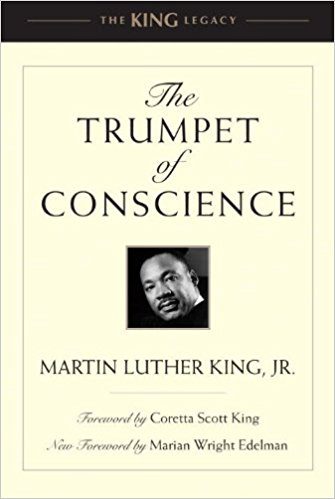Fifty years ago, the Canadian Broadcasting Company (CBC) invited The Rev. Dr. Martin Luther King, Jr. to deliver the renowned Massey Lectures, a series of talks broadcast live over the radio that continues annually to this day. And whereas some lectureships have a narrow focus, the tradition of the Massey Lectures is broad. Speakers are asked to “explore the ideas that make us who we are and ask the questions that make us better human beings.”
If you are interested in reading or listening to these lectures, they have been published in a short book titled The Trumpet of Conscience (Beacon Press)  with an accompanying audio CD. I bring them up because this Christmas Eve was the fiftieth anniversary of Dr. King delivering the final installment of his Massey Lectures, which was broadcast live as he preached to his own congregation from the pulpit of Ebenezer Church in Atlanta, Georgia on December 24, 1967.
with an accompanying audio CD. I bring them up because this Christmas Eve was the fiftieth anniversary of Dr. King delivering the final installment of his Massey Lectures, which was broadcast live as he preached to his own congregation from the pulpit of Ebenezer Church in Atlanta, Georgia on December 24, 1967.
In an interesting coincidence of the calendar, that Christmas Eve, fifty years ago, was also on a Sunday. And this series of talks takes on an added weight when we recall that Dr. King was tragically assassinated a little more than three months later at the far too young an age of thirty-nine (which for those of you who know me personally is the same age I am today).
I don’t mean to be unduly heavy in this holiday season, but it is stunning to consider that if Dr. King were alive today, he would be only 88 years old. He should be with us still as an elder in the movement for peace and justice. Although he is no longer with us, his legacy lives on. And I would like to invite us to spend a few moments reflecting on the message that he wanted the world to hear fifty years ago, a message that continues to be profoundly relevant today.
First, if we are ever to have peace on earth, Dr. King said, we must transcend sectional loyalties. Instead of putting our race, tribe, or class first—instead of putting even “America first”— we must “develop a world perspective.” In Dr. King’s words, “We must either learn to live together…or we are all going to perish together as fools” (70).
Second, Dr. King cautioned that the only way to create a lasting peace is through peaceful means (72). Dr. King was convinced that any attempt to force peace through violence would either intentionally or unintentionally sow the seeds of future violence and retribution. Instead, in the words of the activist A.J. Muste (1885–1967), King called us to consider that, “There is no way to peace. Peace is the way.”
Third, Dr. King said that an essential condition for peace was recognizing what the First Principle in my own tradition of Unitarian Universalism calls “The inherent worth and dignity of every person” (74, 79). Until we ensure that every human being has a basic minimum (clean water and healthy food, a “simple, decent place to live,” access to health care and education), the conditions are ripe, not for peace through the presence of social justice; rather, the conditions are ripe for unrest due to the conditions of social injustice.
Finally, toward the end of his sermon, Dr. King looked back to August 1963, when he stood before the Lincoln Memorial in Washington, D.C. and delivered his famous “I Have a Dream” speech.” A little more than four years later, on December 24, 1967, Dr. King said, “I must confess to you today that not long after talking about that dream I started seeing it turn into a nightmare.” He went on to detail the nightmare of violence that was the Vietnam War and the nightmare of violence that was inflicted upon peaceful civil rights activists, seeking only to assert their “equality under the law” (78).
Today, fifty years later, Dr. King’s legacy is carried forward in the #BlackLivesMatter movement for racial justice, in the #MeToo movement for gender justice, and in the revitalized “Poor People’s Campaign” for economic justice. Dr. King’s dream of building the beloved community is a secularized update of what 2,000 years ago was called the “kingdom of God.” This dream was embodied in the life and teachings of a baby whose birth we remember and celebrate tonight, an infant who grew up to become the Jewish social prophet Jesus of Nazareth.
And in the more than 2,000 years since that baby’s birth, there have been many victories in the ongoing struggle for peace, liberty, and justice (not merely for some) for all. And there have also been many times when the pendulum has swung in the opposite direction—toward violence, greed, and division. That’s why we continue to carve out time in our busy schedules to gather with other progressive and open-minded people. We need one another as companions—as midwives—in the ongoing work of Collective Liberation.
In the words of Dr. King—which he borrowed from the 19th-century Unitarian minister Theodore Parker—it may be true that the “moral arc of the universe bends toward justice,” but there is no guarantee that the arc will bend on its own. The moral arc of the universe needs our help if we are to more fully incarnate the values of Christmas in our lives every day of the year—the values of hope, peace, joy, and love. Together we can accomplish far more than any of us could alone.
The Rev. Dr. Carl Gregg is a certified spiritual director, a D.Min. graduate of San Francisco Theological Seminary, and the minister of the Unitarian Universalist Congregation of Frederick, Maryland. Follow him on Facebook (facebook.com/carlgregg) and Twitter (@carlgregg).
Learn more about Unitarian Universalism: http://www.uua.org/beliefs/principles












